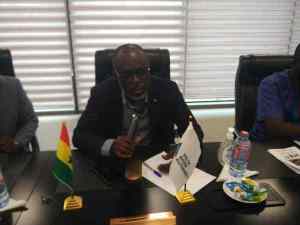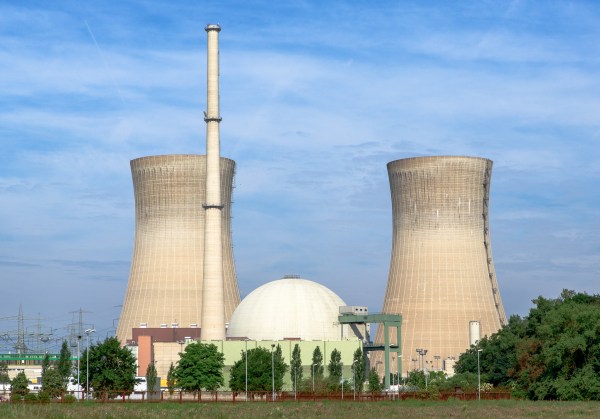Powering Ghana’s economic development through nuclear energy and safety
Electricity supply in Ghana has been overwhelmed by demand for decades. This has led to numerous energy crises, with negative consequences for the economy. Economic development is valued and the country aims to become highly industrialised in the coming years. In order to achieve this, Ghana’s electricity problem needs be addressed. Effectively reviving a decades-old aspiration, the government of Ghana has shown renewed commitment to the implementation of a nuclear power programme and the use of nuclear power plant to drive economic development. Significant steps have been taken to realise this agenda, but there is still much work to be done.


Ghana is considering addition of nuclear power to its energy mix to enhance economic development and provide a stable and affordable supply of electricity to its people. The Government of Ghana established the Ghana Nuclear Power (NPG) Ghana to coordinate all preparatory activities related to the development of the nuclear power plant, with the help of Nuclear Regulatory Authority (NRA), Ghana Nuclear Power Organisation and Technical and Scientific Support Organization.In a bid to pave the way for the nuclear power agenda, Government of Ghana set up Nuclear Power Ghana to oversee the processes leading to the construction and operation of Ghana’s first nuclear power plant.


In series of activities by Nuclear Power Ghana (NPG) to change the myths surrounding nuclear power, it is organizing workshop to educate journalists on how to report on nuclear power project whilst leading advocacy to overcome misconceptions about nuclear in Ghana. NPG in collaboration with Ghana News Agency (GNA) is organizing three days workshop to train Regional Managers of GNA and some news Editors across the country at Haphzibah Christian Center in Eastern Region, Peduase under the theme “Nuclear Safety, and Environment Concerns, strengthening Public Understandings”. The first day of the workshop saw various stakeholders and experts who shared knowledge on the safety of nuclear, relatively cheaper and how it will help stabilize the power sector in Ghana for economic growth.

In a survey conducted by National Academy of Sciences in September 2013, it was found that 82% of Americans feel nuclear energy will play an important role in meeting the country’s future electricity needs, and half believe this importance will increase with time. In addition, 84% of respondents favour renewing operating licenses for nuclear power plants that continue to meet federal safety standards, and 77% believe that nuclear power plants operating in the United States are safe and secure, a four percentage point increase from last February.
Despite this, there are uncertainties. The public is of the view that there is no solution for huge amounts of nuclear wastes being generated. All of the used nuclear fuel generated in every nuclear plant in the past 50 years would fill a football field to a depth of less than 10 yards, and 96 % of this “waste” can be recycled. Used fuel is currently being safely stored. The U.S. National Academy of Sciences and the equivalent scientific advisory panels in every major country support geological disposal of such wastes as the preferred safe method for their ultimate disposal.

The situation is not different in Ghana as misconceptions about nuclear power continues to gain grounds, requesting a deliberate, concerted efforts, collective responsibility of stakeholders, all and sundry to win the war against fake news about Ghana’s nuclear power project. This though, a daunting task, Nuclear Power Ghana believes collaborating with selected journalists in Ghana will play a crucial role in erasing misconceptions about nuclear, to delivering Ghana’s first nuclear power plant, the next green baseload solution.
In line with International Atomic Energy Agency’s (IAEA) standards, there are layers of safety put in place to ensure maximum security and environmental safety. Safety focuses on unintended conditions and events leading to radiological outcomes from authorised activities.
There is always security when it comes to nuclear power plant. Security implies that measures and protocols are put in place to prevent external threats to nuclear materials, and facilities. There is no intention to cause harm because nuclear plants are set up for specific purpose to produce power in tandem with IAEA standards.
There are safeguards These include accountability of nuclear material, placing embargo on activities by Ghana that could lead to acquisition and development of nuclear weapons. Prevention and detection of theft, sabotage and unauthorized access. There is a timely detection of diversion of significant quantities of nuclear materials from peaceful nuclear activities to the manufacture of nuclear weapons. There is prevention and mitigation of accidents, blocking of illegal transfer and other malicious acts involving nuclear material, other radioactive substances and their associated facilities. Protection of workers, the public and the environment from undue radiation exposures, hazards are crucial and must be strictly adhered to. There is absolute deterrence to diversion, early detection whilst ensuring regulatory framework (act). Ghana has ratified international protocols and conventions to ensure safety.
It must be noted that the perception that the word nuclear means explosion has been erased. Commercial-type power reactor cannot explode like a bomb under any circumstances because the fuel is not enriched beyond 5%. Much higher enrichment is required for explosives. Ghana has built robust infrastructure and gone through international peer-reviews.
The perception that the setting up of nuclear power plant implies that there will be an explosion, amounts to total falsehood. Disposal of nuclear waste is properly supervised by regulatory bodies and protocols including IAEA and NRA in Ghana.
Modern nuclear power plants use many barriers to protect people from excessive radiations. Board Chairman of Nucler Power Ghana, Professor Benjamin J.B. Nyarko in his welcome address, acknowledged the urgent need to scale up advocacy on the benefits of nuclear power to ward off myths about nuclear power. Though, he was quick to admit that no industry is immuned to accidents, nuclear power contrary to the myth is very safe and has a way of dealing with climate change.
Executive Director of NPG, Dr. Stephen Yamoah who spoke about the purpose of the workshop stated this will go a long way to sharpen the editorial skills of news editors which in effect will enlighten people on nuclear power. He entreated Journalists to uphold integrity and accountability in their reportage concerning nuclear power to help change the misconceptions in the minds of the populace.
According to US Department of Energy, nuclear power has the biggest capacity as compared to the all the energy source in the world. Nuclear Power has 92.5% of capacity factor, which basically means it produces maximum power of more than 92% during the year. When it compares to 41.5 hydropower Ghana’s main source of power and 24.9% of solar. Apparently, many powerful nations are collaborating with other nations to build the nuclear power plant.
Ghana has suffered economically in the past few years to power outages (Dumsor) due to high demand and pressure on the Akosombo Dam, Thermal plants in Takoradi, Tema, Bui Power Authority and others based on increasing demand for electricity. It is important to anchor the point that successasive governments attempted to resolve power crisis in Ghana, but all their actions have been knee-jerk reactions rather than proactivity.
With the nuclear power project, currently going through all the phases to be fully built in Ghana, the power crises will be out of the windows, which will also help stabilize the economy.
Director of Nuclear power Institute at Ghana Atomic Energy Professor Seth K. Debrah in his presentation, spoke about the key institutions of NPG which include Nuclear Power Ghana as operator/owners, Nuclear Regulator Authority ( NRA) as regulator, Technical and Scientific Support Organisation. He emphasizes on how important the Technical and Scientific Support Organisation is needed to complement the efforts of NPG. Prof. Debrah spelt out the three phases under Ghana’s nuclear power project with phase one been the preparatory phase otherwise known as first milestone, which Ghana has successfully completed and now at the second phase.
Phase two talks about technical and scientific support for project implementation, which is been worked on. While the third and final phase has to do with designing, construction and commissioning of Ghana’s first nuclear power plant. According to Dr Stephen Yamoah, it is projected that Ghana will see it first nuclear power plant by 2030 in full operation. The nuclear power plant according to the experts will be situated closed to the sea, and the preferred site will be selected by the end of this year.
Director in-charge of Installations at Nuclear Regulatory Authority (NRA) Dr. Emmanuel Ampoma-amoako also detailed the roles various stakeholders will play to make the project fully completed.
Contributing to the debate, Technical Director of MIDA and former Chief Executive of GridCo Ing. William Amuna explained Ghana’s readiness for nuclear power and how it will help final consumers to pay less cost of power because nuclear power is relatively cheap but ensures stable power supply as against erratic power distribution.
Clearly, hearing all these encouraging talks from experts, characterised by facts and figures point to one thing. With nucler power plant, Ghana will have enough electricity for its citizens, industry and export surpluses to neighbouring countries for foreign exchange.
Board Chairman of GNA, Ransford Tetteh commended the nuclear power Ghana for organizing this workshop, which will empower Journalists to effectively communicate with their audiences in nuclear power.
Many recommendations, IAEA protocols need to be followed with the Nuclear Power Ghana (NPG) on the forefront. These include but not limited to ensuring a stable political environment for the development of a nuclear power programme, taking concrete steps to follow-through on commitments to develop a nuclear power programme and implement IAEA recommendations. Adequate nuclear research, training programmes coupled with a strong legal and regulatory nuclear framework from the start. That way, nuclear power plant will be safe and secured as Ghana’s next green baseload solution.
In this discourse, commercial-type power reactor cannot explode like a bomb under any circumstances because the fuel is not enriched beyond 5%. Much higher enrichment is required for explosives. Ghana has built robust infrastructure and gone through international peer-reviews. Therefore, security, safeguards and safety are guaranteed.
Source: Jerry John Akornor/Raymond Karvi















DONATION TO SUPPORT THIS WEBSITE: 0599896099 +233599896099 Thank you for your contribution!
Related



















































